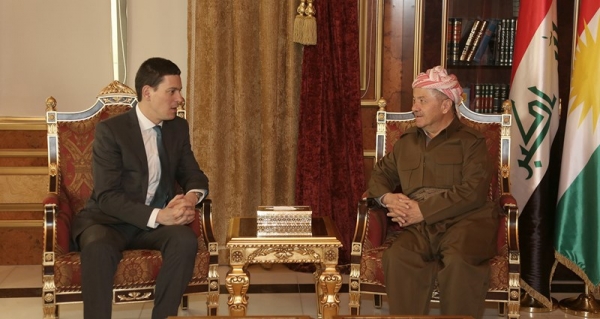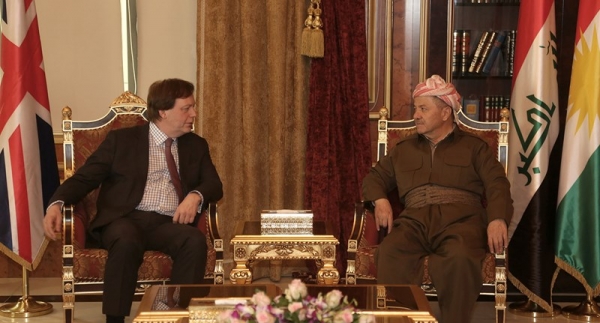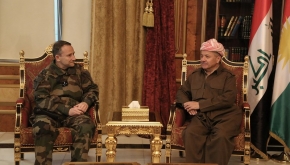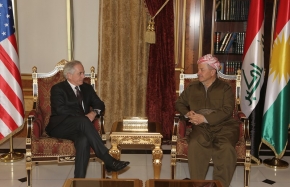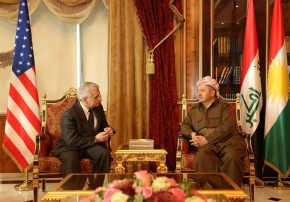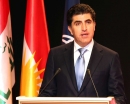President Barzani Discusses Situation of IDPs with IRC President Miliband
Kurdistan Region President Masoud Barzani today met with President of the International Rescue Committee (IRC) David Miliband in his office in Salahaddin to discuss the humanitarian situation of the IDPs and refugees in Kurdistan.
Mr. Miliband said his organization has been active in Kurdistan, and he is here to find out for himself how the IRC could further help the KRG cope with the large numbers of IDPs. He said the IRC would conduct advocacy in countries around the world to direct more urgently needed assistance for IDPs and help the KRG cope with this heavy burden.
For his part, President Barzani thanked the IRC for its activities helping IDPs and refugees. He stated that providing shelter and assistance for the IDPs is a priority of the KRG, but the fundamental solution to this problem is to expel the terrorists and for these people to then be able to return to their homes.
The two also discussed the political and security situation in the country in general.
Kurdistan Region President Meets UK Ambassador to Iraq
Kurdistan Region President Masoud Barzani today met with the UK Ambassador to Iraq, Mr. Frank Baker in his office is Salahaddin today. The President and the UK Ambassador exchanged views on the fight against the ISIS terrorists, UK support to the peshmerga forces, and the relations between Erbil and Baghdad.
Kurdistan Region President Meets French Chief of Defense
President Masoud Barzani today met French Chief of Defense General Pierre de Villiers in Salahaddin to discuss the fight against the ISIS terrorists. President Barzani said the people of Kurdistan appreciate France’s continuous support for the peshmerga forces in the fight against ISIS.
For his part, General Pierre de Villiers said that France will stand by the people of Kurdistan in this fight, and it would continue to provide military support to the peshmerga forces.
President Barzani Meet US Senator Bob Corker
Kurdistan Region President Masoud Barzani met with US Senator Bob Corker, Chairman of the Senate Committee on Foreign Relations.
The President and the US Senator discussed the progress of the fight against ISIS terrorists, and international coalition support for the peshmerga forces in this fight.
Senator Corker, who was accompanied by US Ambassador to Iraq Stuart Jones, praised the leadership of President Barzani and the bravery of the peshmerga forces in pushing back ISIS terrorists and said that the United States would continue to help the peshmerga forces. He also said that the people of the United States have deep appreciation for the sacrifices made by the people of Kurdistan in confronting ISIS terrorists and in taking in many internally displaced people from other parts of Iraq.
President Barzani thanked the US senator and the American people for their support of Kurdistan. The President said that fighting the ISIS terrorists cannot be the responsibility of Kurdistan and the members of the international coalition alone; other countries, he said, must also step up their efforts.
President Barzani Meets US Senator Jack Reed
Kurdistan Region President Masoud Barzani met with US Senator Jack Reed, ranking member of the Senate Armed Services Committee.
The President and the US Senator discussed the progress of the fight against ISIS terrorists, and US and coalition support for the peshmerga forces in this fight.
Senator Reed, who was accompanied by US Ambassador to Iraq Stuart Jones, praised the leadership of President Barzani and the bravery and sacrifices of the peshmerga forces in pushing back ISIS terrorists. He said the United States would continue to help the peshmerga forces in providing air support, training and with the provision of arms. He added that the people of the United States have deep appreciation for the sacrifices made by the people of Kurdistan in confronting ISIS terrorists and for their generosity in providing refuge many internally displaced people from other parts of Iraq.
President Barzani thanked the US senator and the American people for their support of Kurdistan. The President said that fighting the ISIS terrorists cannot be the responsibility of Kurdistan and the members of the international coalition alone; other countries, he said, must also step up their efforts. He said that other countries must help to stop the flow of ISIS fighters, and also to dry up their sources of funding.
President Barzani Chairs Meeting of Kurdistan’s Party Leaders and KRG Oil and Gas Council
Kurdistan Region President Masoud Barzani chaired a joint meeting of the leaders of Kurdistan Region’s five main political parties and the KRG oil and gas council, which included the KRG Prime Minister and Deputy Prime Minister as well as KRG Ministers of Natural Resources and Planning.
The meeting focused on the problems facing the Kurdistan Region, particularly the fight against ISIS terrorists, and the recently-signed Erbil-Baghdad deal on oil sales and budget share of the KRG.
At the outset of the meeting, President Barzani talked about the result of his meetings with world leaders during his participation at the Munich Security Conference earlier this month. He said the whole world views the Kurdistan Region and its peshmerga forces with great admiration for standing up to the ISIS terrorists and for taking in large numbers of IDPs from other parts of Iraq.
The participants of today’s meeting issued a statement in which they paid tribute to the bravery and sacrifices of the peshmerga. They also underlined the importance of preserving Kurdish unity in the face of the current challenges facing the Region.
On the deal between Erbil and Baghdad, their statement said, “The people of Kurdistan and the regional government consider it their legitimate right, per Iraqi Constitution Articles 112 and 115 and per the 2015 Iraqi budget law, to pursue exploration and export of oil from Kurdistan. Only this will fundamentally solve the budget and payroll issues facing the people of Kurdistan. The KRG remains committed to all sections of the deal signed between Erbil and Baghdad. Baghdad must equally be committed to all section of this deal. Any technical problems can be addressed through dialogue. ”
The meeting expressed its support of the KRG and expressed its hope that the KRG would be able to resolve the budget and payroll problems.
PM Nechirvan Barzani speaks in KRG-World Bank conference on Refugees and IDPs
Erbil, Kurdistan Region, Iraq, (gov.krd) – In a conference held in Erbil to discuss the results of a joint programme conducted by Kurdistan Regional Government and World Bank on the impact of internally displaced people on the Kurdistan Region’s economy and society, Prime Minister Nechirvan Barzani stressed the urgent need for additional assistance to address the crisis.
Prime Minister Barzani said, “The presence of close to two million refugees and IDPs has changed the demography of the Kurdistan Region; the population of the Region increased by 28 percent in 2014.” He stressed “The crises has placed a huge burden on the KRG, particularly in the sectors of education, health services, housing and related services, and employment.”
Following is the text of Prime Minister Barzani’s speech:
Ladies and Gentlemen,
Representatives from foreign countries,
Representatives of the World Bank,
Good morning to you all and welcome,
I am pleased to be here with you today to participate in this gathering to discuss the implementation of an important program pertaining to refugees and internally displaced persons (IDPs), and their impact on our Region’s economy and society.
I would like to thank the World Bank for accepting our request to assist in assessing the impact of refugees and IDPs on the socioeconomic life of the Kurdistan Region and the burden on the KRG.
I would also like to thank the KRG Ministry of Planning and relevant KRG organisations for the support they provided in conducting the assessment.
Ladies and gentlemen,
After 2003 the KRG embarked on a wide-ranging programme to achieve stability, economic development, and to improve all sectors in the Kurdistan Region. Some developments were achieved very quickly. Within a short period of time, our Region became a shining example on the map of the Middle East.
Regarding certain important issues and treatment by the Iraqi federal government we cannot deny the fact that we have had difficulties. Unfortunately, the previous Iraqi federal government did not take positive steps toward resolving outstanding issues; indeed, it further complicated the issues.
The impact of the Syria crisis has directly affected the Kurdistan Region. A significant number of Syrian refugees sought safe haven in our Region. Taking into consideration the international principles of human rights, we opened our doors and provided them with refuge and humanitarian assistance.
Due to worsening security elsewhere in the country, Iraqi citizens of all ethnic and religious backgrounds have been fleeing to our Region.
Triggered by overwhelming security events in Anbar, Salahuddin, and later Nineveh Governorates most displaced people arrived during the past one year. When Daesh (Islamic State terrorist organization) assumed control in Mosul and other areas, numerous Iraqi citizens became victims of brutal terror and ethnic cleansing, particularly Christians and Yezidis.
The sudden attacks by Daesh terrorists against the Kurdistan Region with advanced weapons captured from Iraqi army plunged the Kurdistan Region into an unwanted war. The Peshmerga forces performed their duty faithfully and continue to defend the security and dignity of the people of our Region along a frontline of more than one thousand kilometre long.
These crises occurred within a very short time and initially there was no plan on how to confront them. The former federal Iraqi government worsened the crisis. In early 2014 the federal government withheld the payment of Kurdistan Region employees’ salaries and complicated the federal budgeting process. In addition to dealing with humanitarian and security challenges, the Kurdistan Region also faced a serious financial crisis.
The KRG believes the current crisis will end. But today we need the international community to provide major additional military and humanitarian support to our Region.
The presence of close to two million refugees and IDPs has changed the demography of the Kurdistan Region; the population of the Region increased by 28 percent in 2014. The crisis has placed a huge burden on the KRG, particularly in the areas of education, health services, housing, and employment.
I reiterate my call to the international community to take the situation of the Kurdistan Region seriously and to urgently provide additional assistance.
The data and information being presented today by the Ministry of Planning and the World Bank are of great importance to our Region. It will help develop a road map to effectively address the financial and humanitarian challenges facing the Kurdistan Region.
The KRG pays serious attention to this study. Although the findings are not encouraging, it will help us deal with the humanitarian, security and financial challenges we face. This study highlights the impact of the current crisis on health and other sectors. We should deal with the findings carefully. Notably, in some areas the number of refugees and IDPs exceeds the local population.
The existence of such a large number of refugees and IDPs is causing a negative impact on the daily life of our people. Major impacts include price inflation of basic commodities and high unemployment. The people and the government of the Kurdistan Region are under significant pressures.
I am very proud of the welcoming attitude of our people towards refugees and IDPs who have sought refuge in our Region. But we have to be mindful that the KRG alone, with its limited resources, cannot adequately care for the people of the Kurdistan Region as well as refugees and IDPs.
Regrettably, the Federal Government of Iraq has not taken the issue of displaced people in the Kurdistan Region seriously enough. Even though IDPs are all Iraqi citizens, the federal government has not yet adequately addressed their needs. For the KRG to cover their needs, one billion and four hundred thousand US dollars will be needed this year.
I would like to extend my gratitude to the members of international coalition against Daesh, to UN Agencies and international organizations and governments for their support and solidarity in providing humanitarian and military assistance to our Region. We keep in mind, however, that considering the magnitude of the crisis we are in need of major additional assistance.
I would like to express my sincere gratitude to the people of the Kurdistan Region and to the staff of the KRG for their resilience and support during such critical times. Today the Kurdistan Region on the one hand faces funding constraints by the federal government and on the other hand is directly involved in the fight against Daesh.
The people of Kurdistan Region are experiencing a war situation that brings only destruction, calamity, and socioeconomic turmoil.
I also take this opportunity to thank our heroic peshmerga who fight a most brutal international terrorist organization with their limited resources to defend the security and stability of our Region. To effectively continue the fight and to successfully put an end to this war it is essential the international coalition provide our peshmerga with heavy weaponry and advanced military expertise.
It is expected that the fight against Daesh and the Syrian crisis to continue and the crisis facing the Kurdistan Region will not end in the near future. It is likely that more IDPs and refugees will seek refuge in our Region.
To strengthen our capacity to address the humanitarian and security crises it is thus very important to implement effective mechanisms in coordination with the federal government and the international community.
In Iraq, the crises have resulted from inadequate compliance with the constitution, political exclusion, and excessive concentration of political and economic power, particularly during the previous federal administration.
I call upon the current Iraqi Federal Government to take the humanitarian crisis caused by IDPs and refugees seriously and to make it a national priority. From a legal point of view, the onus of responsibility first lies with the federal government. I also urge the federal government to make concerted efforts to obtain international recognition of the crimes committed against Yezidi Kurds as acts of genocide and to play an effective role in the protection of our Christian brothers and sisters.
In the midst of the current challenges we remain committed to efforts that enhance democracy and political stability, and to defend universal human rights, peaceful coexistence, and religious tolerance.
We believe in ourselves and we are determined to build a strong economy. We are for good neighbourly relations with our neighbouring countries as well as to improving our Region. I look forward to the KRG, the World Bank, and the rest of the international community playing more effective roles in alleviating the suffering of all displaced people in the Kurdistan Region.
Once again, welcome to you all. I wish you all success. Thank you.
Erbil and Baghdad reiterate their commitment to the oil agreement
Erbil, Kurdistan Region, Iraq, (gov.krd) – A Kurdistan Regional Government senior delegation, headed by Prime Minister Nechirvan Barzani was received in Baghdad yesterday by Iraq’s Prime Minister Haider al-Abadi and a number of Iraq’s federal government officials. The two sides held two meetings during this one day visit of the Kurdistan Region delegation to Baghdad.
The main objective of the meetings was to discuss the implementation of the agreement reached last December between the Kurdistan Regional Government and the Federal Government of Iraq on oil export and budgetary issues.
During the meeting, it became apparent that due to the financial crisis in Iraq and the lack of liquidity, the Iraqi government is unable to pay the Kurdistan Region’s share of January and February from the federal budget.
The two sides agreed to continue holding further talks in order to find an appropriate solution to the situation.
Regarding the implementation of the December agreement, the Kurdistan Regional Government delegation presented a timetable for the export of oil from the Kurdistan Region, which was accepted by the Federal Government of Iraq. Both sides reaffirmed their commitment to the agreement, while working to settle the immediate problem facing the agreement due to the financial crisis that affects whole of Iraq.
The two sides also discussed the latest developments in Iraq, the war against the Islamic State terrorist organization, ISIS, and the importance of coordination between the Peshmerga forces and the Iraqi Army in the fight against terrorism.
In his visit to Baghdad, Prime Minister Barzani was accompanied by Deputy Prime Minister, Qubad Talabani, the Chief of Staff to President of the Kurdistan Region, Dr. Fuad Hussein, Minister of Natural Resources, Ashti Hawrami, Minister of Planning, Ali Sindi, Minister of Finance and Economy, Rebaz Muhammad and KRG spokesperson, Minister Safeen Dizayee.
PM Nechirvan Barzani receives Japanese Ambassador to Iraq
Erbil, Kurdistan Region, Iraq, (gov.krd) - Kurdistan Regional Government Prime Minister, Nechirvan Barzani, yesterday received the Japanese Ambassador to Iraq, Mr. Kazuya Nashida.
The Japanese Ambassador thanked the Kurdistan Regional Government for its stance and support following the murder of the Japanese citizen in Syria at the hands of the Islamic State terrorist organization, known as ISIS. He conveyed his condolences to the families of the Peshmerga forces who have been martyred in the fight against terrorism.
In another part of the meeting, Ambassador Nashida pointed out that, as part of Japan’s assistance to Iraq, his government will fund an infrastructural project related to the sewage system in Erbil city, which will be officially announced soon. He reaffirmed Japan’s commitment to continuing to help the Kurdistan Region.
The two sides discussed the latest developments in Iraq and the Kurdistan Region, particularly the situation in various battlefields. Prime Minister Barzani highlighted Kurdistan Region’s needs and requirements in its war against ISIS.
They also discussed the latest visit by a Kurdistan Regional Government delegation to Baghdad and the agreement reached last December between Baghdad and Erbil. Prime Minister Barzani told the Japanese Ambassador that Baghdad had officially informed the Kurdistan Region that the lack of liquidity in Iraq is the reason that Iraq is unable to send the Kurdistan Region its allocated share from the federal budget as was finalised in the agreement, last December.
The Prime Minister Barzani thanked the Japanese government for having funded several projects in the Kurdistan Region.
PM Barzani and Turkish Prime Minister discuss bilateral relations between Erbil and Ankara
Ankara, Turkey, (gov.krd) - Turkey’s Prime Minister Ahmet Davutoğlu on Thursday received a delegation from the Kurdistan Regional Government, headed by Prime Minister Nechirvan Barzani.
The two sides discussed the relations between Kurdistan Region and Turkey, stressing the need to further develop and strengthen bilateral relations, particularly in the fields of energy and trade.
The war against the so called Islamic State terrorist organisation, known as ISIS, the role of Kurdistan Region Peshmerga Forces and relations between Erbil and Baghdad, were also discussed in the meeting.
Prime Minister Barzani was accompanied by KRG Deputy Prime Minister, Qubad Talabani, Minister of Natural Resources, Ashti Hawrami, Minister of Planning, Ali Sindi and Minister of Finance and Economy, Rebaz Muhammad.
More...
PM Barzani meets a delegation from the Islamic Republic of Iran
Latest News
- President Nechirvan Barzani visits Iranian Consulate General to pay respects to victims of Kerman terrorist attack
- President Nechirvan Barzani receives outgoing French Ambassador
- President Nechirvan Barzani condemns terrorist bombings in Iran
- President Nechirvan Barzani meets with US Deputy Secretary of State
- President Nechirvan Barzani’s New Year Address
- KRG Prime Minister Meets with US Deputy Secretary of State
- KRG Prime Minister Engages in Key Talks with UNAMI Chief
- KRG Prime Minister Hosts Diplomats from Iraq and Kurdistan Region
- KRG Prime Minister Meets with the UN’s Secretary-General at COP28
- President Nechirvan Barzani meets with Turkish Ambassador
- KRG Prime Minister Welcomes UK Military Delegation
- President Nechirvan Barzani meets with UK Chief of the Defense Staff’s Senior Middle East Advisor
- KRG Prime Minister Discusses Regional Issues and Domestic Policies in Special Panel
- KRG Prime Minister Meets with Former British Prime Minister
- MEPS Forum in Duhok Highlights Climate Change Among Key Global Challenges
- KRG Prime Minister Meets with United Nations Delegation
- President Nechirvan Barzani and French Ambassador discuss the situation in Iraq and the region
- President Nechirvan Barzani meets with Head of the Independent Strategic Review of UNAMI
- KRG Prime Minister Inaugurates 5th International Trade Fair for Industry and Construction
- KRG Prime Minister Meets Qatar's Consul General
- President Nechirvan Barzani meets with Iraq’s Oil Minister
- KRG Prime Minister Welcomes Cardinal Sako of the Chaldean Catholic Church
- KRG Prime Minister Meets with Iraq's Energy Officials
- KRG Prime Minister Meets with British Ambassador
- President Nechirvan Barzani meets with UK Ambassador to Iraq
- KRG Prime Minister Welcomes Iraq’s Federal Prime Minister
- President Nechirvan Barzani meets with Prime Minister Mohammed Shia Al-Sudani
- KRG Prime Minister Welcomes Al-Ittihad Sports Club
- President Nechirvan Barzani at Paris press conference: Iraq should not be drawn into regional conflicts
- President Nechirvan Barzani and President Emmanuel Macron hold wide-ranging discussion on Iraq and the region

